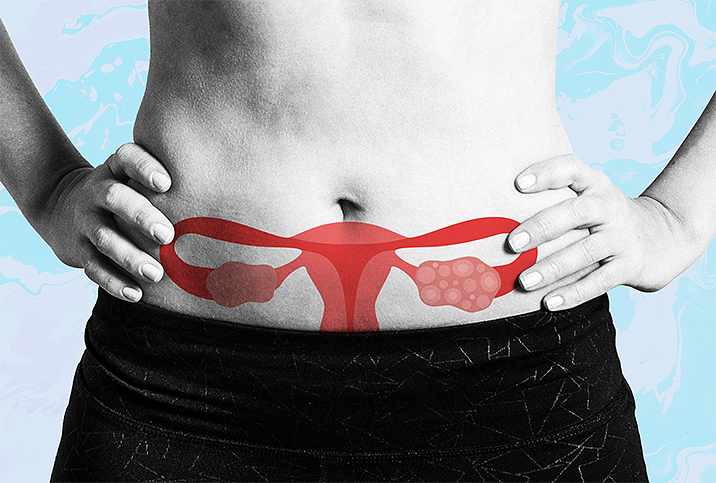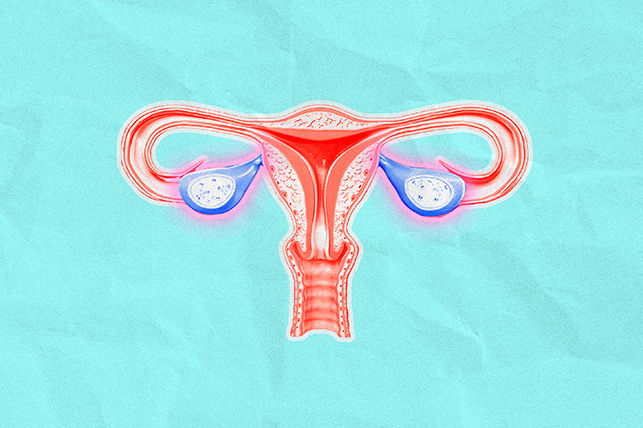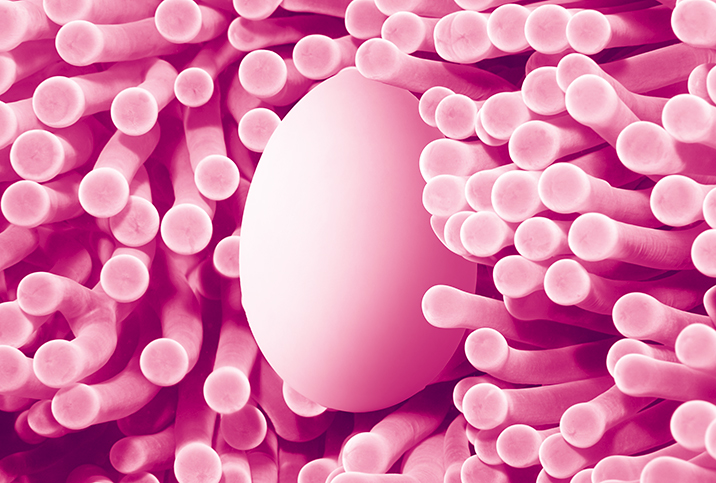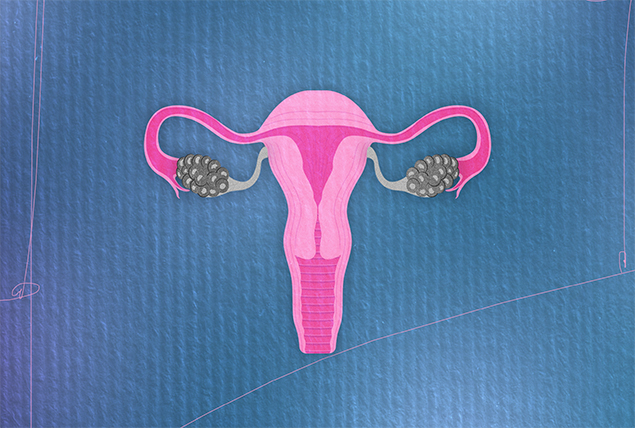Here's How You Can Keep Your Ovaries Healthy

While the ovaries—the two organs located on each side of the uterus—are only the size of grapes, they play a huge role in the female reproductive system, and require a certain amount of care and attention.
These small but mighty organs store and release the eggs, and are involved in the production and regulation of female sex hormones estrogen and progesterone, according to Laura Purdy, M.D., a hospitalist and family medicine doctor at Williamson Medical Center in Franklin, Tennessee, and the chief medical officer of Wisp, a telehealth company that specializes in women's health.
The female reproductive system can't function without the ovaries, as they contribute to the processes of menstruation and conception, Purdy said. That's why it's important to be aware of the different procedures, treatments and habits that can help you maintain and improve your ovarian health.
Screening can help keep your ovaries healthy
Some of the main health issues that can arise within the ovaries include ovarian cysts, ovarian cancer and ovarian torsion. Ovarian torsion—when the ovary twists on itself and cuts off the blood supply—is extremely rare and serious. However, the condition presents severe symptoms that make it easy to catch, Purdy said.
Ovarian cysts, tumors and cancer, on the other hand, rarely present symptoms, especially early on—making them more challenging to detect.
As of right now, Purdy said, there is, unfortunately, no effective screening process for the ovaries.
Pap smears are designed to measure cervical and lower uterine health, while pelvic exams with speculums allow for examination of the cervix and the walls of the vagina. Research shows that even manual exams, in which the provider puts their fingers inside the vagina and presses on the abdomen to try and feel the ovaries, are relatively ineffective, too, Purdy said.
"The ovaries really are elusive," she said. "I hope that over the next couple of decades we can get a better handle on how to be more proactive."
Ovarian cysts, tumors and cancer rarely present symptoms, especially early on—making them more challenging to detect.
Still, there are methods to proactively check your ovarian health, especially if you know you have a history of breast cancer or ovarian cancer in your family. Getting genetic testing done is an effective way to determine if you have a genetic predisposition, as mutations in the breast cancer susceptibility genes BRCA1 and BRCA2 and gene mutations associated with Lynch Syndrome, for example, increase your risks of developing ovarian cancer.
"Some people may say, ‘I don't wanna know,'" Purdy said, "But, genetic testing helps you understand whether you're inherently at a risk for developing ovarian cancer."
If you learn you face an increased risk, there's also the option of proactively having your ovaries and fallopian tubes surgically removed.
Caring for your ovaries includes monitoring yourself for symptoms and seeking care if something doesn't feel right, Purdy said. If you experience symptoms such as pain or pressure in the pelvis, intense bloating, nausea or diarrhea, irregular vaginal bleeding and irregular or abnormally painful periods, be sure to see your healthcare provider to determine whether or not your ovaries are healthy.
"I will say that it is still important to follow up with your doctor for all of the recommended screening exams," Purdy said. "Pap smears, still getting those abdominal exams, still following up for annual physicals, because sometimes signs and symptoms can be detected even though there's no recommended routine screening tests."
Treatments to keep your ovaries healthy
If you are diagnosed with an ovarian health condition, there are a few different types of procedures you may need to undergo, depending on the kind of problem you're experiencing.
When it comes to ovarian cysts, which are often both painless and harmless, the first step in treatment may be simply waiting to see if they go away on their own, as they often do, according to Monte Swarup, M.D., an OB-GYN in the Phoenix area and the founder of HPV Hub.
If a cyst grows very large, presents severe symptoms or appears to be at risk of becoming cancerous, surgical removal—called a cystectomy—may be necessary, Swarup said.
A relatively small cyst may be removed by laparoscopy, which is a minimally invasive surgery done using a camera and small incisions in the abdomen. A larger, potentially cancerous cyst may need to be removed in a more traditional, open procedure requiring a larger incision called a laparotomy.
Surgery is a common treatment for an ovarian cancer diagnosis, according to John P. Diaz, M.D., the chief of gynecologic oncology at the Baptist Health Miami Cancer Institute. What kind of surgery and how much is needed depends on the specific type of cancer and the stage of diagnosis, Diaz said.
Minimally invasive surgery is often needed to determine how far the cancer has spread, which is called "staging," and cytoreductive surgery, in which the goal is to remove all visible disease, may also be necessary, Diaz said.
The more the cancer has spread, the more tissue must be removed. The uterus, both ovaries, fallopian tubes and the omentum will often be removed during surgery for ovarian cancer.
"Treatment with chemotherapy is recommended for nearly all women except those with very early-stage disease," Diaz said.
Chemotherapy can be administered directly into a vein through an IV or it can be given by intraperitoneal (IP) chemotherapy—meaning the drugs are delivered through a port directly into the abdomen.
This form of treatment uses a cytotoxic agent to destroy cancer cells. It can be given to kill remaining cancer cells following a surgical procedure, to reduce the risks of the cancer returning, to shrink an ovarian tumor ahead of surgery or to help manage pain and symptoms in extremely advanced cases.
Prevention and maintenance to keep your ovaries healthy
If your ovaries are healthy—at least as far as you know—and you're looking to take proactive, preventive steps to ensure they stay that way, there are some things you can do in your day-to-day life.
Using oral contraceptives for more than five years decreases your risk of developing ovarian cancer by up to 50 percent, Diaz said, and this helps to prevent the development of ovarian cysts by halting ovulation.
Breastfeeding and giving birth likewise reduce your risk of developing ovarian cancer.
Leading a healthy lifestyle can also reduce your risk of ovarian complications, Swarup said. This includes eating a healthy and balanced diet filled with whole, vitamin-rich foods. Exercising regularly is another important way to reduce your risk, as is avoiding tobacco products and excessive alcohol.


















